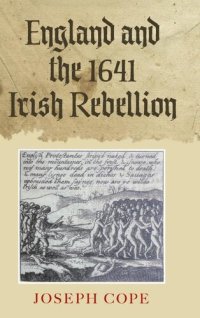
Ebook: England and the 1641 Irish Rebellion (Studies in Early Modern Cultural, Political and Social History, 8) (Volume 8)
Author: Joseph Cope
- Publisher: Boydell Press
- Language: English
- pdf
The study shows how the 1641 Irish Rebellion played an integral role in politicizing the English people and escalating the political crisis of the 1640s.
The 1641 Irish Rebellion has long been recognized as a key event in the mid-17th century collapse of the Stuart monarchy. By 1641, many in England had grown restive under the weight of intertwined religious, political and economiccrises. To these audiences, the Irish rising seemed a realization of England's worst fears: a war of religious extermination supported by European papists, whose ambitions extended across the Irish Sea. England and the 1641 Irish Rebellion explores the consequences of this emergency by focusing on survivors of the rising in local, national and regional contexts. In Ireland, the experiences of survivors reflected the complexities of life in multiethnic and religiously-diverse communities. In England, by contrast, pamphleteers, ministers, and members of parliament simplified the issues, presenting the survivors as victims of an international Catholic conspiracy and assertingEnglish subjects' obligations to their countrymen and coreligionists. These obligations led to the creation of relief projects for despoiled Protestant settlers, but quickly expanded into sweeping calls for action against recusants and suspected popish agents in England. England and the 1641 Irish Rebellion contends that the mobilization of this local activism played an integral role in politicizing the English people and escalating the political crisis of the 1640s.
JOSEPH COPE is Associate Professor at the State University of New York at Geneseo.
The 1641 Irish Rebellion has long been recognized as a key event in the mid-17th century collapse of the Stuart monarchy. By 1641, many in England had grown restive under the weight of intertwined religious, political and economiccrises. To these audiences, the Irish rising seemed a realization of England's worst fears: a war of religious extermination supported by European papists, whose ambitions extended across the Irish Sea. England and the 1641 Irish Rebellion explores the consequences of this emergency by focusing on survivors of the rising in local, national and regional contexts. In Ireland, the experiences of survivors reflected the complexities of life in multiethnic and religiously-diverse communities. In England, by contrast, pamphleteers, ministers, and members of parliament simplified the issues, presenting the survivors as victims of an international Catholic conspiracy and assertingEnglish subjects' obligations to their countrymen and coreligionists. These obligations led to the creation of relief projects for despoiled Protestant settlers, but quickly expanded into sweeping calls for action against recusants and suspected popish agents in England. England and the 1641 Irish Rebellion contends that the mobilization of this local activism played an integral role in politicizing the English people and escalating the political crisis of the 1640s.
JOSEPH COPE is Associate Professor at the State University of New York at Geneseo.
Download the book England and the 1641 Irish Rebellion (Studies in Early Modern Cultural, Political and Social History, 8) (Volume 8) for free or read online
Continue reading on any device:

Last viewed books
Related books
{related-news}
Comments (0)